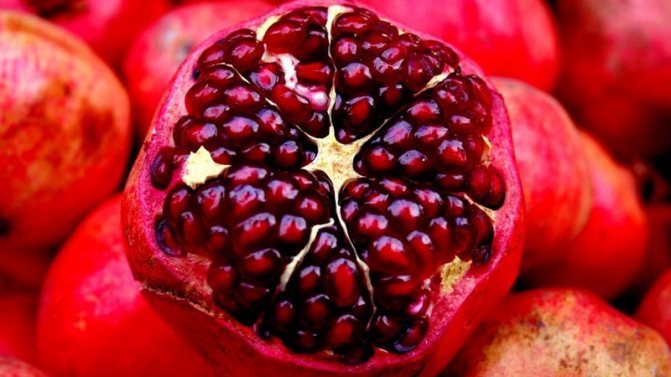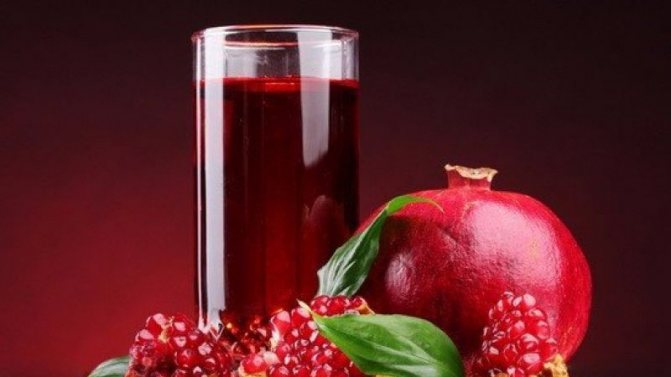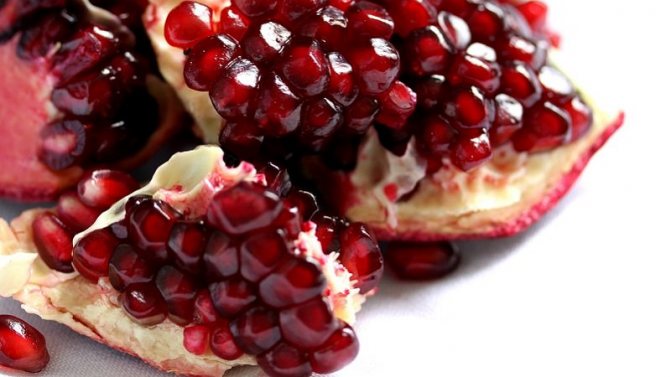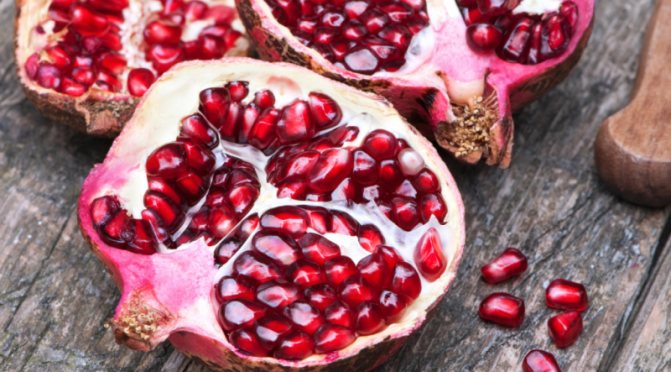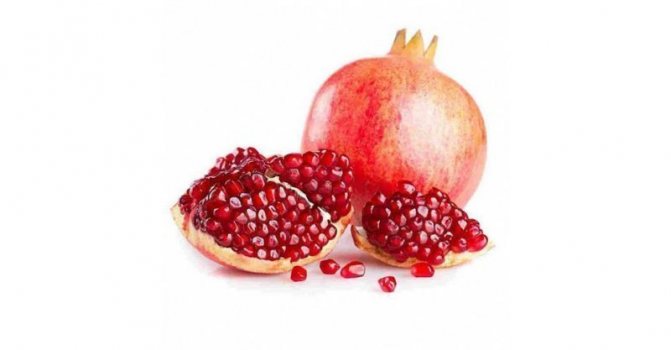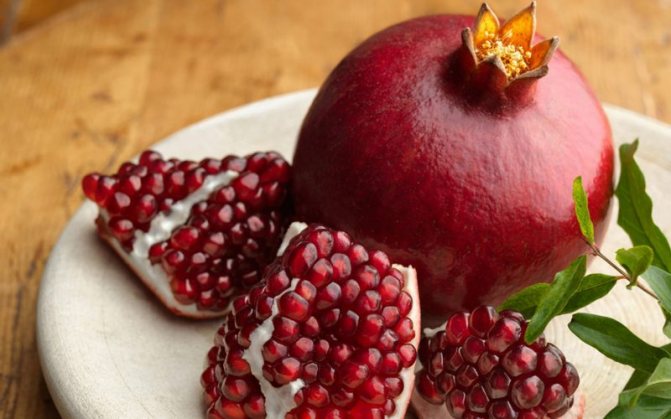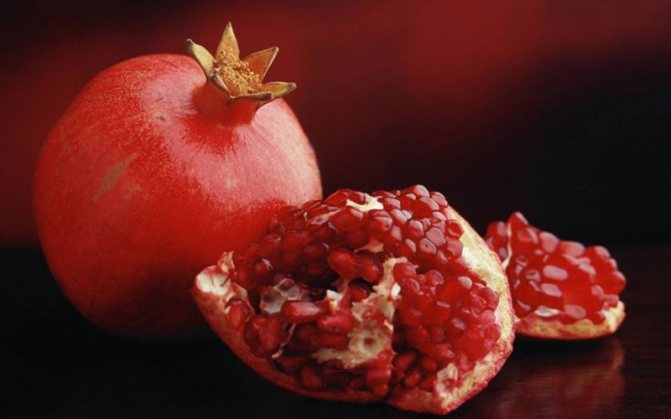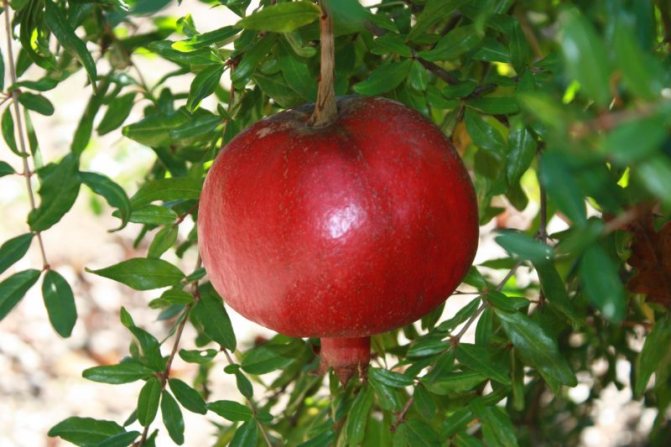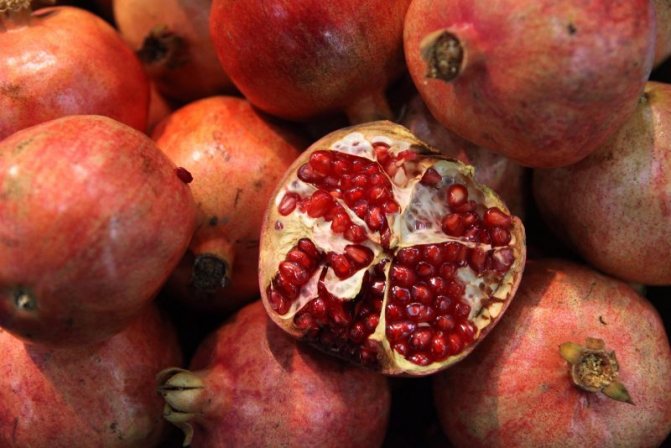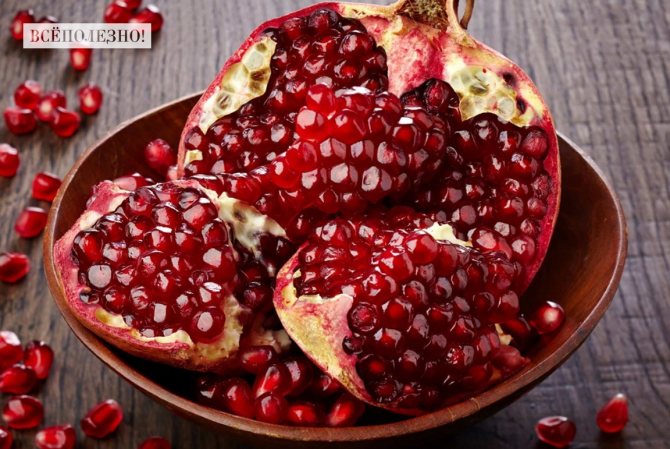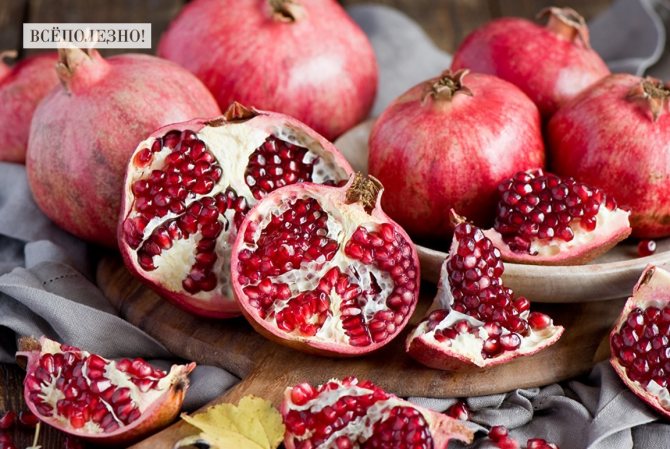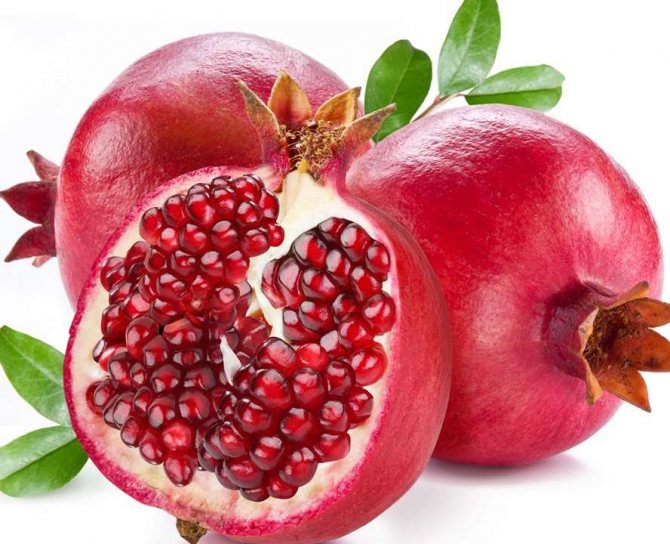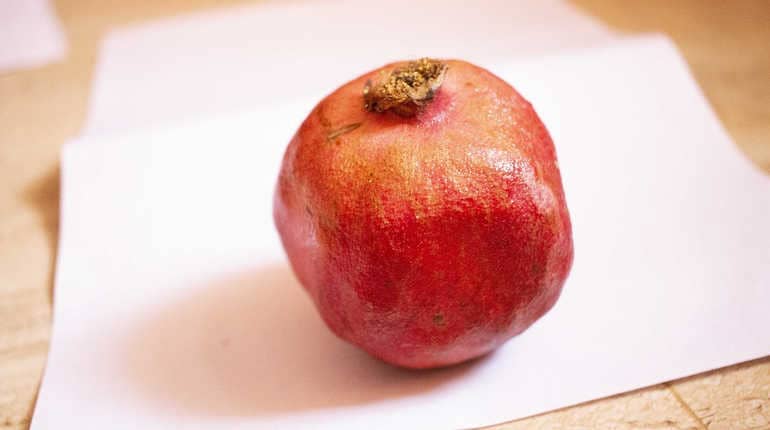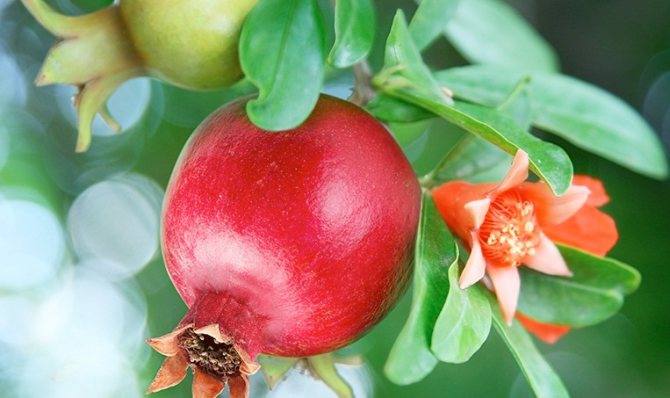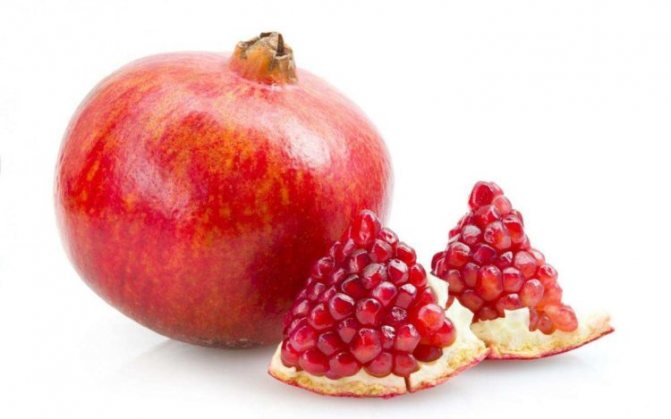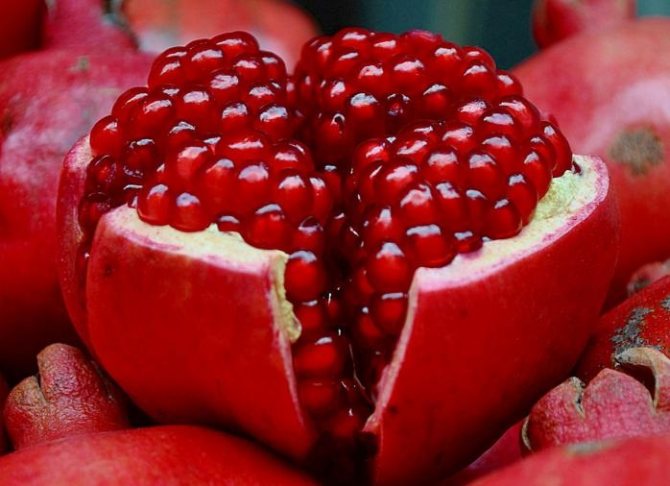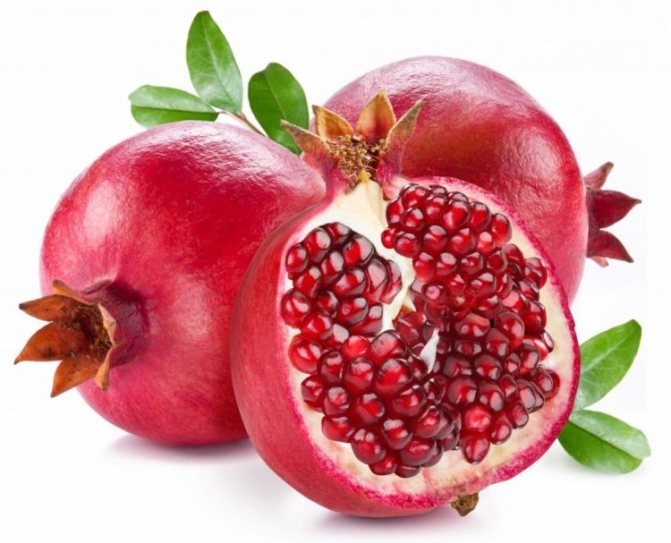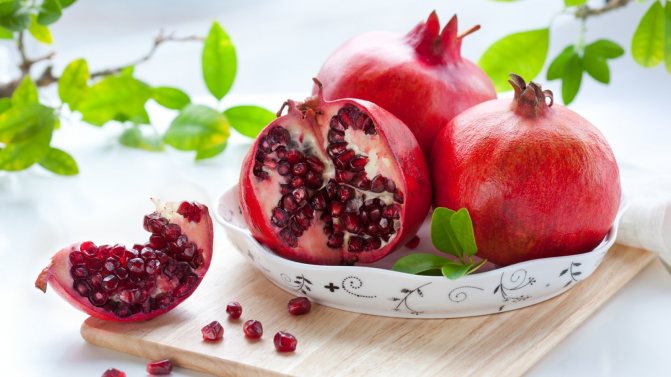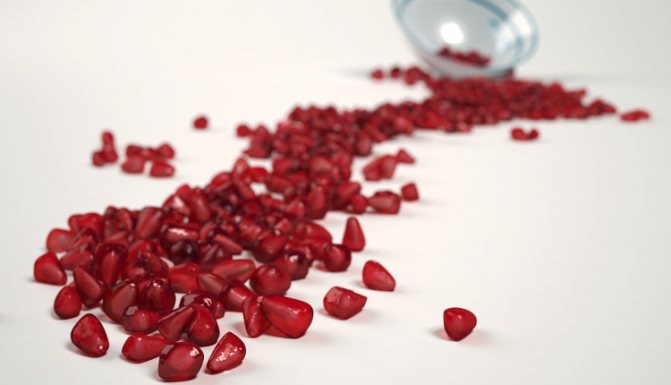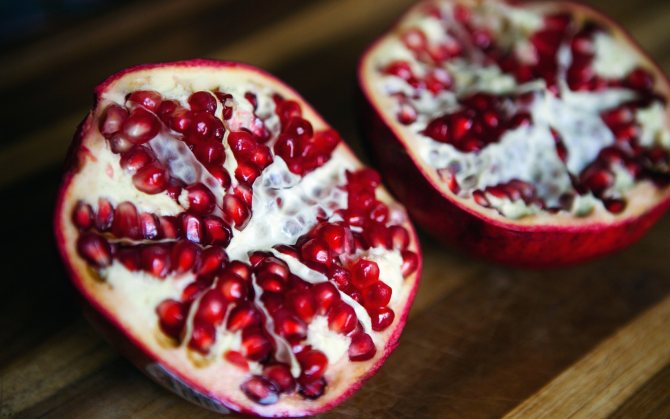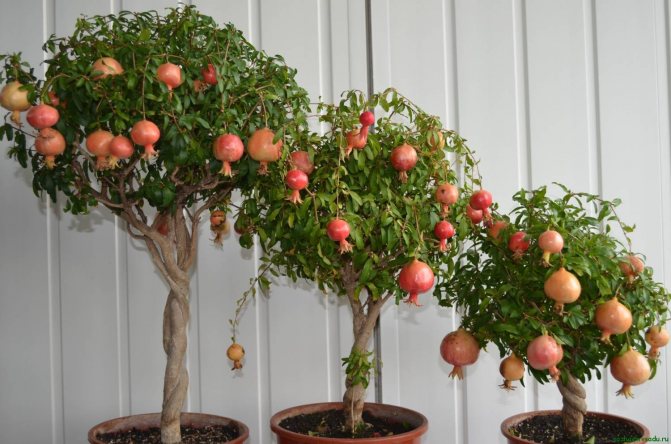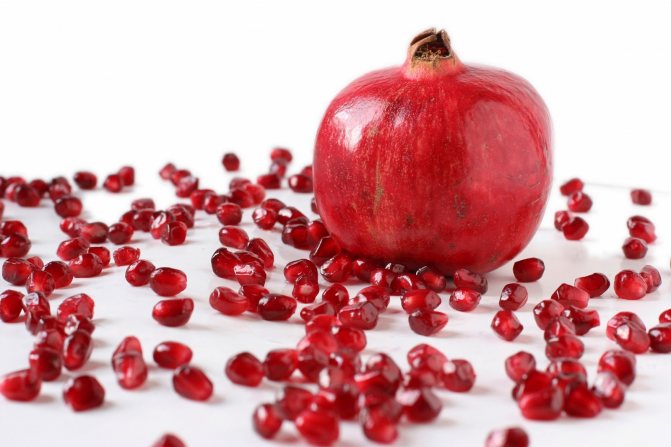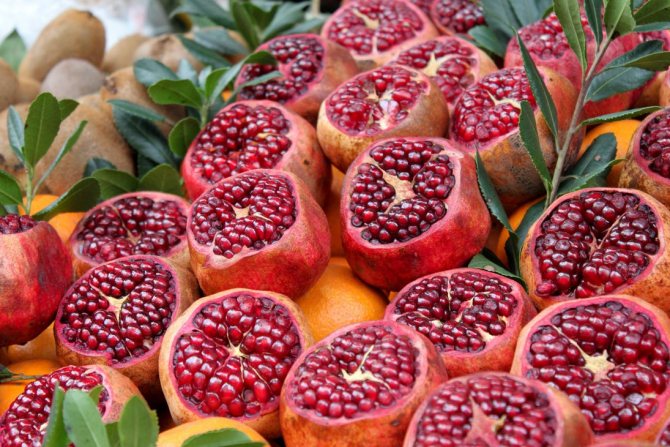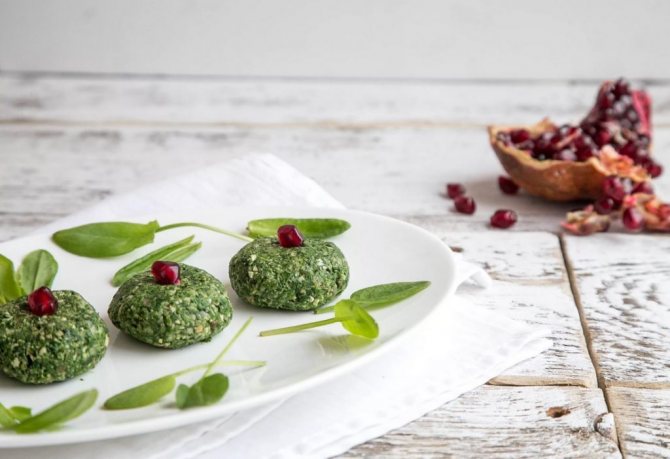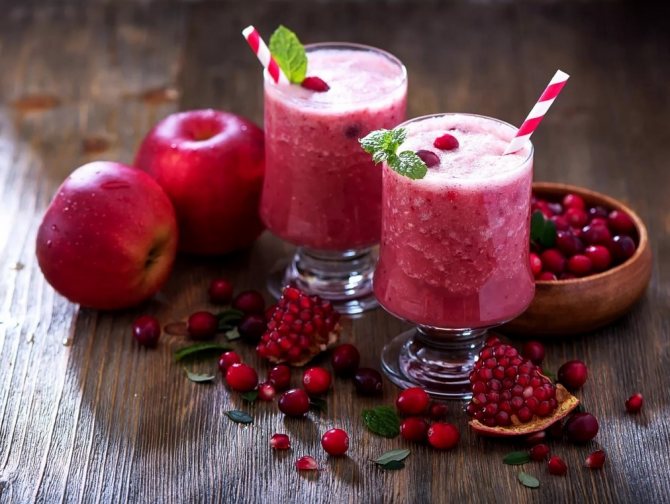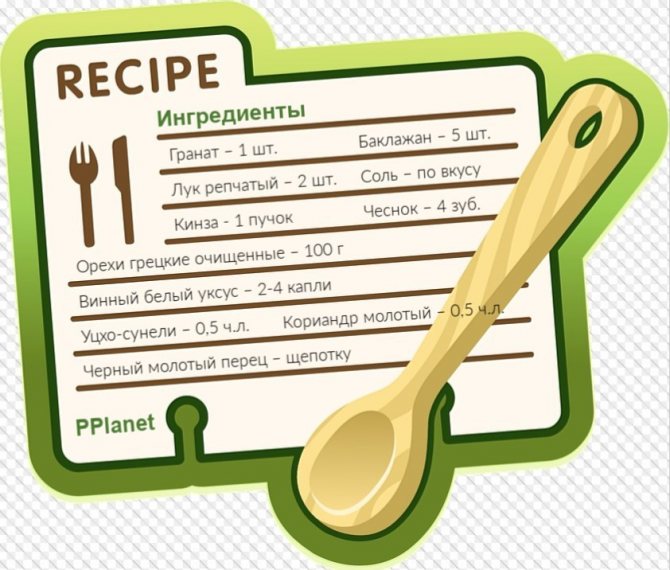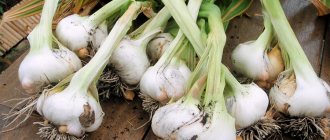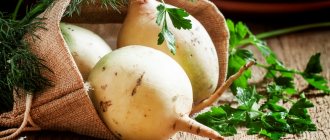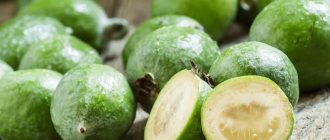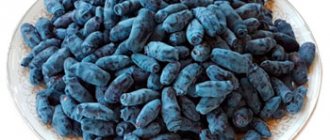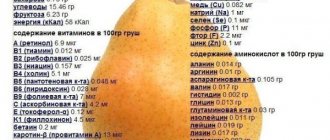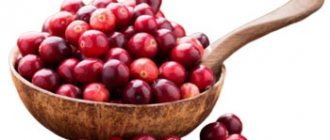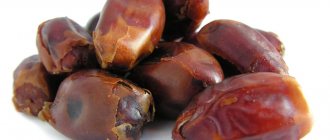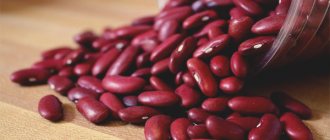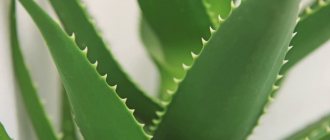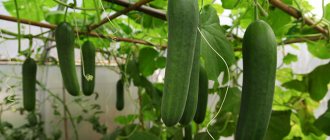Why is pomegranate useful?
The beneficial properties of pomegranate are explained by the large amount of vitamins and nutrients. This fruit quenches thirst well and awakens appetite. It can be used as a biogenic stimulant.
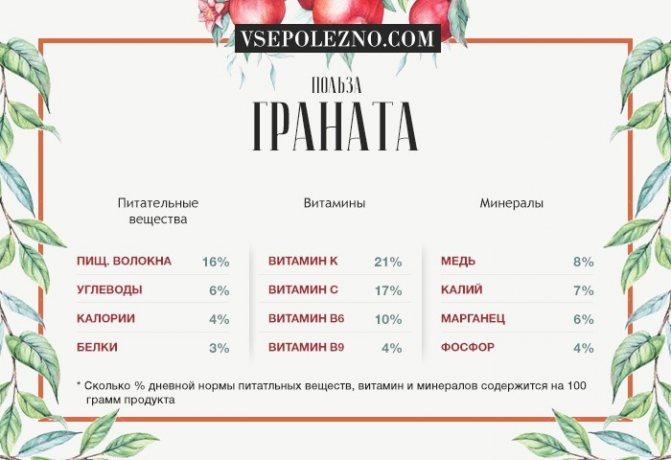
It is recommended for use by the elderly and patients who have undergone surgery. Pomegranate juice is used as a hematopoietic agent to prevent the development of pathology of the circulatory system.
With regular use, such a fruit is able to raise vitality.
Beneficial features:
- strengthening physical endurance;
- relieving fatigue;
- improved concentration;
- strengthening of immunity;
- positive effect on the nervous system.
Not only the fruit itself will be useful, but also juices and decoctions based on it. The use of such a product should be moderate, otherwise, problems with tooth enamel may arise.
Contraindications
There is a proverb: "Everything excessive is vicious." When using pomegranate, it is worth adhering to this simple truth.
This fruit contains a large amount of acid, which can lead to exacerbation of chronic diseases. If a person's body did not know this product before, then it should be used with caution in food.
Oriental fruit is contraindicated for people who suffer from diseases:
- ulcers of the stomach and duodenum;
- allergy;
- pancreatitis;
- gastritis with high acidity;
- caries, pulpitis.
The healing properties of pomegranate
Pomegranate is recommended for the prevention of a number of diseases. This fruit is useful for the following clinical conditions:
- pathology of the cardiovascular system;
- atherosclerosis;
- cancer;
- anemia;
- upset stomach;
- worms;
- insomnia;
- cold.
The composition of pomegranate contains a large amount of potassium, which is necessary for normal water-salt balance. In turn, the water-salt balance plays an important role in the functioning of the heart muscle.
Reference! With atherosclerosis, pomegranate and its juice help cleanse blood vessels.
This product strengthens and restores the elasticity of the vascular walls. It can be used to normalize blood pressure. Pomegranate contains a large amount of antioxidants that contribute to the suppression of cancer. The juice is recommended for patients during chemotherapy treatment. This fruit can be used as a preventive measure against the development of anemia.
Important!
Useful substances activate the production of red blood cells and hemoglobin.
There are tannins in the pomegranate peel, so they are recommended to be used to combat gastrointestinal disorders. Due to the presence of alkaloids, the fruit is used to prevent worms. Pomegranate has anti-inflammatory properties, it lowers fever and helps with coughs.
Useful properties of pomegranate peel
The pomegranate rind is just as healthy as the fruit itself. On its basis, a powder is prepared with an astringent effect. It is effective in the development of enteritis. This powder can be used to sprinkle small wounds or scratches on the skin.
Find out 6 ways to peel a pomegranate, there are really cool ways!
A decoction of pomegranate peels is used to treat colds.It can also be used to rinse the mouth. Such a folk medicine will help in the prevention of stomatitis and bleeding gums.
Dried partitions can be added to tea. Such a drink will have a relaxing effect, thereby eliminating insomnia.
Chemical composition
Pomegranate is a source of useful trace elements that are necessary for the normal functioning of the body. 100 g of fruit contains from 49 to 70% juice, 27-50% peel and crusts and 7-20% seeds.
The composition contains the following useful substances:
- carbohydrates: fructose, sucrose and glucose;
- fats;
- organic acids;
- proteins;
- ash;
- tannins;
- cellulose;
- minerals.
The product contains phenolic compounds and anthocyanins. The former are necessary to enhance immunity, while the latter give the fruit its characteristic color. In total, such a product contains 15 amino acids, most of them are indispensable for the human body.
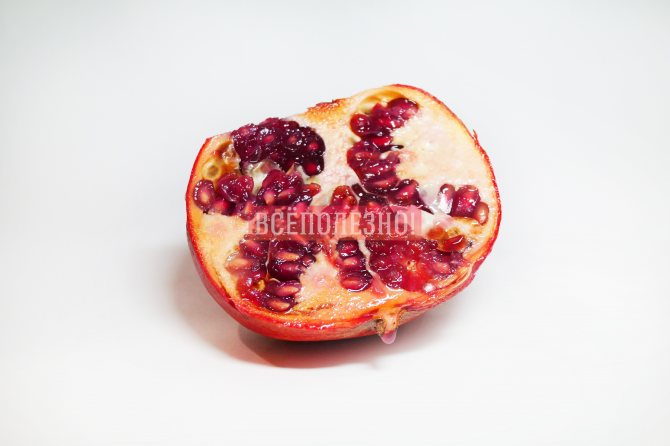

Variety and varieties
Since seedless pomegranate is still a rarity, there are not so many varieties of it. Without exception, all fruits are very juicy, they are pleasant to eat for both adults and children. In addition, it is easy to get juice from them.
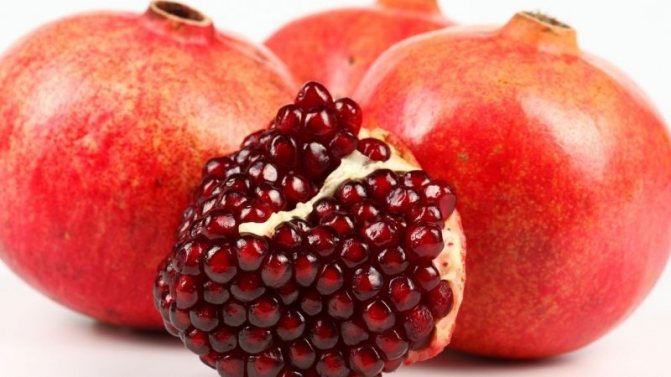

There are only a few seedless varieties of pomegranate.
In Peru, the seedless pomegranate variety "Vandeful" is most often bred. Its fruits are medium in size, weighing up to 300 g, the yield is rather low: 14 - 15 kg per tree. "Vandefulu" is preferred in Israel and Asian countries.
But in Spain the most popular variety is Mollar de Elche. It is more productive and its fruits are large (up to 800 g). This variety is also characterized by a thin fruit skin, and the grains underneath are very sweet.
How many calories are in pomegranate
The fruit has a rather sweet taste, but at the same time it has a low calorie content - 53 kcal. It can be consumed by people who are overweight and have high blood sugar. Pomegranate is often used as a dietary supplement. It allows you to make the diet more balanced and healthy.
Why are pomegranates useful for women?
The benefits of pomegranate for the female body is to improve the condition of the skin. This fruit is especially useful for pregnant women, and is also recommended for the prevention of breast cancer.
Pomegranate is the only fruit that contains 3 types of antioxidants. They not only improve the functioning of the immune system, but also protect the body from the harmful effects of the environment and various diseases.
This fruit is good for acne-prone skin. Thanks to the presence of vitamins A, E, C and iron, the guarantor helps prevent the early appearance of wrinkles, and also slows down the aging process of the body. Pomegranate helps protect the skin from the formation of age spots and hyperpigmentation, so the skin looks more well-groomed and youthful.
Good to know! Pomegranate seed extract is recommended for the prevention of skin cancer.
The use of pomegranate oil is equally useful. It moisturizes the skin well. Due to the presence of a large amount of folic acid and other beneficial substances, pomegranate is especially useful for pregnant women. Folic acid is essential for the growth and development of the fetus and the normal well-being of the expectant mother.
Pomegranate contains a large amount of ellagitanin, which inhibits the development of estrogen-dependent breast cancer.
Why is pomegranate useful for men
The pomegranate contains all the necessary vitamins and minerals that are needed to maintain men's health.
Vitamin C has antioxidant properties and is involved in the formation of dopamine. This hormone is responsible for a man's sex drive.Vitamin E is essential for the normal functioning of the endocrine glands, which activate the production of the male sex hormone - testosterone.
Important!
The benefits of pomegranate are to improve the condition of blood vessels, which in turn minimizes the risk of developing impotence.
B vitamins are actively involved in metabolic processes, and they also maintain the tone of peripheral vessels. Zinc takes part in the formation of testosterone, and also reduces the concentration of aromatase in the blood, which reduces potency. This improves sperm quality and increases sperm motility. It is recommended to use pomegranate to prevent the development of prostate diseases.
We talked in more detail about the benefits of pomegranate for children in a separate article, be sure to read it!
What harm can be to the body
Like any other product, pomegranate has not only beneficial properties, but also contraindications:
- When consumed undiluted, freshly squeezed pomegranate juice, high acid levels can affect the digestive tract.
- An acidic environment can also negatively affect enamel. Do not drink the concentrate if your teeth are sensitive to acids.
- The high content of active substances requires compliance with the daily intake of any part of the fruit. Abuse can cause nausea and gastrointestinal upset.
- Allergy sufferers with intolerance to the components of pomegranate are also required to refrain from consumption.
- In the presence of any chronic diseases that can be aggravated by any of the components, you should consult your doctor about the possibility of use.
- Cannot be given to children under one year old.
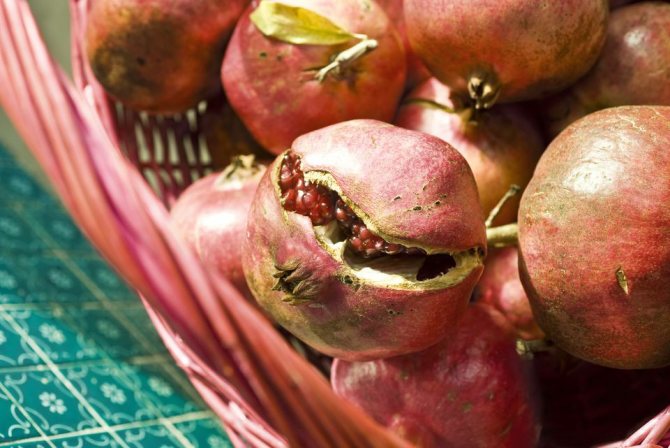

Be attentive and careful, even when eating the healthiest fruits! Always remember the wise saying of Paracelsus: “Everything is poison and medicine. Determines only the dose. " Well, and, of course - remember that each person is unique.
Pomegranate treatment
In the East, pomegranate was often used as a medicine. Tibetan healers have used this product to treat renal colic, diarrhea and diabetes. Medicines based on this fruit have been used externally to treat burns and conjunctivitis. The Arabs used the juice to eliminate angina pectoris and headaches.
Modern scientists have proven that pomegranate has anti-inflammatory and antispasmodic effects. On the basis of such a fruit are prepared:
- decoctions;
- medicinal powders;
- scrubs;
- oils.
To prepare the broth, you need 20 g of dried peel and 200 ml of water. The product is boiled for 20 minutes, then filtered. The medicine is recommended to be taken in 2 tbsp. 2 times a day.
This broth can be used as a bactericidal, astringent and anti-inflammatory agent. It can be used for compresses for burns, dermatosis or seborrhea.
A decoction of pomegranate peels is an excellent remedy for hair loss. In cosmetology, it is used to eliminate age spots and freckles.
Pomegranate powder is used to treat diarrhea. To prepare it, you need to dry the peel and grind it in a coffee grinder. The resulting product is recommended to be stored in a paper bag. To eliminate diarrhea, take 1 tsp. The dry base is poured with 1 glass of water and infused for an hour. The astringent effect will be noticeable after a single dose. An overdose of such a remedy is fraught with constipation.
A scrub is prepared on the basis of dry pomegranate peels. The crushed base must be mixed with fine salt and regular washing gel. It cleanses the skin well and does not dry it out.
Homemade pomegranate oil is made from olive oil. The peel is infused on it for two weeks.
Interesting! At the factory, pomegranate oil is produced by pressing the seeds.
This tool is suitable for both external and internal use.If you mix pomegranate oil with essential oil, then it can be used for massage.
Popular recipes
Pomegranate salad
Astringent seeds go well with many foods. Salad with pomegranate and chicken is a classic of a festive feast. The dish includes:
- half a chicken (600 gr.);
- 2 potatoes;
- 1 carrot;
- 2 hard-boiled eggs;
- 1 onion;
- 200 gr. walnuts;
- 200 gr. mayonnaise;
- 100-150 gr. pomegranate seeds;
- salt to taste.
How to cook
- Boil chicken until tender (salt to taste), carrots, potatoes and eggs.
- Refrigerate.
- Peel potatoes and carrots, grate on a coarse grater.
- Peel, wash, chop the onion (finely).
- Separate the chicken meat from the skin and bones, tear into pieces.
- Peel, fry, chop walnuts.
- Clear the pomegranate.
- Peel and chop the eggs (finely).
- Put the products on a dish in layers 0.5-1 cm thick.Salt each layer a little and cover with mayonnaise (0.5 tablespoons walnuts, the rest 1.5 tablespoons):
- 1st (bottom) - chicken;
- 2nd - bow;
- 3rd - potatoes;
- 4th - carrots;
- 5th - walnuts;
- 6th - eggs.
- Sprinkle the pomegranate seeds on top.
- Refrigerate for soaking for 4 hours.
Jam
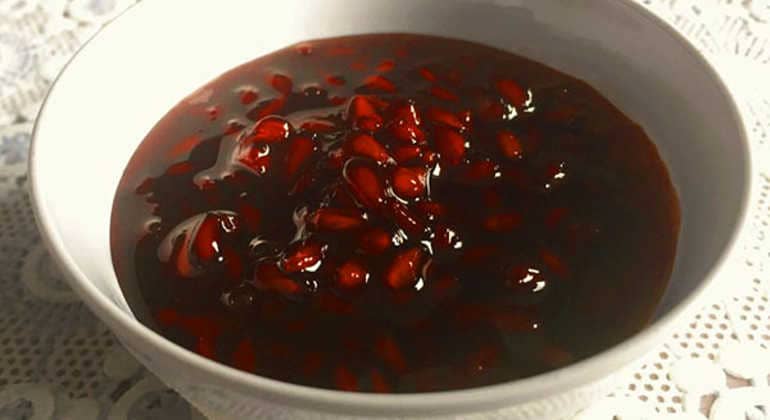

To make pomegranate jam according to this recipe, you will need fruit juice. The easiest way to get it out of the fruit is to roll the pomegranate over a hard, flat surface with hand pressure.
The process continues until the fruit is completely soft. Then make a hole in the fruit with a knife and drain the liquid.
Jam ingredients:
- 200 ml. juice;
- 4 fruits;
- 300 gr. Sahara.
How to cook:
- In a wide bowl, mix the juice and sugar.
- Bring the plates to a boil on the maximum setting.
- Reduce temperature.
- Cook until thick and dark, skimming off the foam.
- Add pomegranate seeds.
- After boiling, turn off the stove.
- Insist for a day.
- Boil for another 30 minutes.
- Pour into jars.
- Roll up.
- Insulate for 24 hours.
The finished jam thickens, acquires a bright rich color.
Pomegranate compote
To make pomegranate compote you will need:
- 2 fruits;
- 300 gr. Sahara;
- 2 l. water.
Preparation
- Wash and clean the pomegranates. Separate the grains from the films. Pour into a saucepan.
- To fill with water.
- Add sugar.
- Boil.
- Cook for 10 minutes.
- Remove from the stove, cover, let it brew.
- Strain.
- Pour into a prepared container.
This compote is perfect as a cooling drink, both for every day and for the holidays. Keep refrigerated.
Why pomegranate is harmful
In addition to its benefits, pomegranate can be harmful to the body, if you do not pay attention to contraindications.
Such a product must be discarded under the following clinical conditions:
- chronic stomach diseases: gastritis or peptic ulcer;
- age from 1 year;
- chronic constipation;
- hemorrhoids.
Store juice is dangerous because it can contain a large number of unnatural additives.
Freshly squeezed juice should be consumed in small quantities as it has a negative effect on tooth enamel. It is best to dilute it with water before use, after taking it you need to rinse your mouth.
Before using medicines based on pomegranate peel, it is necessary to consult with a specialist, since they contain pelletierin and alkaloids.
How to use it correctly
In order not to damage the grain when cleaning the pomegranate, you must:
- Cut the skin in a circle at the bottom and top of the berry.
- Remove it slowly.
- Make shallow cuts along the fruit where the separating films are.
- Open the fruit at the incision site with a little effort.
- Separate the grains from the skins.
A ripe pomegranate contains over 700 seeds that can be consumed. They contain coarse fibers that support normal digestion.
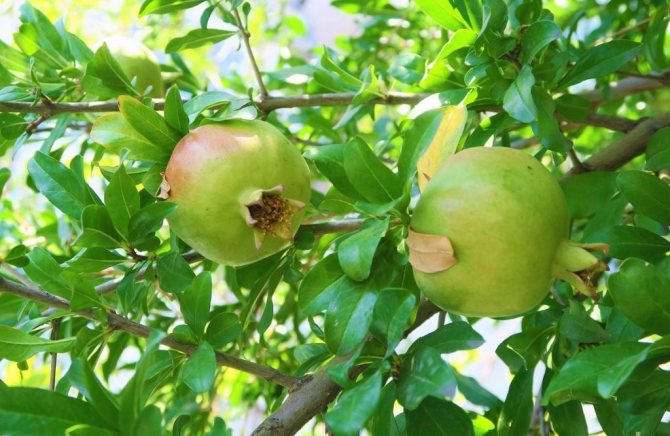

Useful properties of pomegranate juice
Only high-quality pomegranate juice will be useful. It can be used as a diuretic. Its advantage lies in the fact that the juice does not wash out potassium from the body, as drugs do with the same effect.
Important!
It is recommended to introduce such juice into the diet to improve heart function, normalize blood pressure and relieve edema.
The drink improves blood flow and stimulates the hematopoietic system, thereby preventing the development of anemia. The composition of pomegranate juice contains substances that can have a depressing effect on malignant tumor formations. The drink is useful in case of depletion of the body, as it helps to restore strength and strengthen the body.
Pomegranate is a versatile and healthy product. On its basis, you can prepare juice, decoction or powder. It is an excellent remedy for disease prevention. It is allowed to be consumed during pregnancy. It is important to remember about a sense of proportion and contraindications.
Fruit storage
Storing a pomegranate is not a hassle. The fruits remain fresh after being harvested at room temperature for 2-3 weeks. It should be remembered that these fruits do not ripen like peaches or plums. In the vegetable compartment of the refrigerator, the shelf life is increased to 2 months.
Drinking a glass of juice every day or including a salad with pomegranate in the diet is a simple way to promote health and prevent the effects of carcinogens and toxins.
Of course, the fruit cannot cure the disease. However, pomegranate is useful in that it slows down the development of inflammation, the spread of the malignant process. Juicy grains help to improve the health of women, men and children, strengthen immunity and improve mood.

